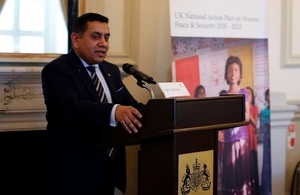UK drives progress on gender equality in the Middle East
Lord Ahmad visited Turkey and Iraq following the launch of the government’s 5-year women, peace and security strategy.

Lord Ahmad delivers the National Action Plan speech in Istanbul, Turkey
Foreign Office Minister of State Lord Tariq Ahmad of Wimbledon, the Prime Minister’s Special Representative on Preventing Sexual Violence in Conflict, visited Turkey and Iraq between 1 and 4 March 2018 to mark the recent launch of the UK’s National Action Plan (NAP) on Women, Peace and Security.
Launched in January in London, the plan sets a bold new direction, putting women and girls at the heart of Britain’s work to prevent and resolve conflict for the next 5 years. As part of this, a series of priority countries, including Iraq and Syria, have been identified as places where the UK will focus its efforts.
Lord Ahmad said:
Women and children are often the worst affected in conflict situations, which is why we have put women and girls at the heart of our foreign policy work.
One of my main priorities this year is to ensure that women and girls are able to fully participate in all areas of life, including ensuring all girls receive a quality education.
It is vital that women, in Iraq, Syria and worldwide, see all barriers removed so that they can participate fully in political processes, conflict resolution and mediation, and to secure justice and accountability against perpetrators of sexual violence. That is the only way we can build a more sustainable, peaceful world.
Whilst in Turkey, the Minister met with female Syrian politicians and activists, to discuss protecting women’s rights in conflict. Women and girls in Syria are disproportionately affected by the war, facing sexual and gender-based violence, forced prostitution and early marriage. The UK supports organisations working with survivors of sexual and gender-based violence, providing education to girls and ensuring a stronger role for women in political negotiations. The Minister announced £1.5 million of UK funding to empower women in Syria’s political processes.
The Minister also met with female Turkish human rights advocates, politicians and business figures at the NAP launch, expressing the UK’s support for women’s political participation and empowerment around the world. He also hosted an inter-faith roundtable with Turkish faith leaders.
In Iraq, Lord Ahmad met with faith leaders, including Yezidi and Christian leaders, where he sought their views on challenges following Daesh’s defeat and reiterated the UK’s commitment to freedom of religion or belief across Iraq.
Lord Ahmad had meetings with parliamentarians, ministers from the Iraqi government, KRG Prime Minister Nechirvan Barzani, and civil society, with discussions on women’s participation in the upcoming Iraqi elections, supporting survivors of sexual violence, and girls’ education.
Lord Ahmad visited Mosul, which was devastated during Daesh’s time, and a women’s centre at a camp for people internally displaced by the years of conflict. UK aid funding through the Iraq Humanitarian Pooled Fund and other projects has helped to provide support against gender based violence, specialist protection and rehabilitation for escapees of Daesh, and counselling. The Minister confirmed nearly $1 million for the UN Women’s Peace and Humanitarian Fund to support women’s grassroots organisations in Iraq.
Visiting Camp Hasansham, Lord Ahmad said:
This Women’s Centre is providing vital support to women and girls, a space where they can meet, learn new skills, and above all be safe.
UK aid has provided desperately needed assistance here. The UK remains committed to supporting the urgent needs of the 2.4 million displaced people in Iraq, whilst also supporting the Government of Iraq’s efforts to stabilise the country and help those who have returned to their homes.
Meeting with the Iraqi Ministers of Foreign Affairs and Education and KRG Prime Minister Barzani, the Minister also raised counter-terrorism and counter-violent extremism efforts, exploring how best to defeat Daesh’s ideology in schools, and maintaining momentum on efforts to hold Daesh to account for its crimes.
Further information
-
Follow Foreign Office Minister Lord Ahmad of Wimbledon on Twitter @tariqahmadbt
-
Follow the Foreign Office on Twitter @foreignoffice and Facebook
-
Follow the Foreign Office on Instagram, YouTube and LinkedIn